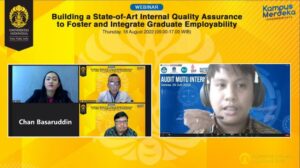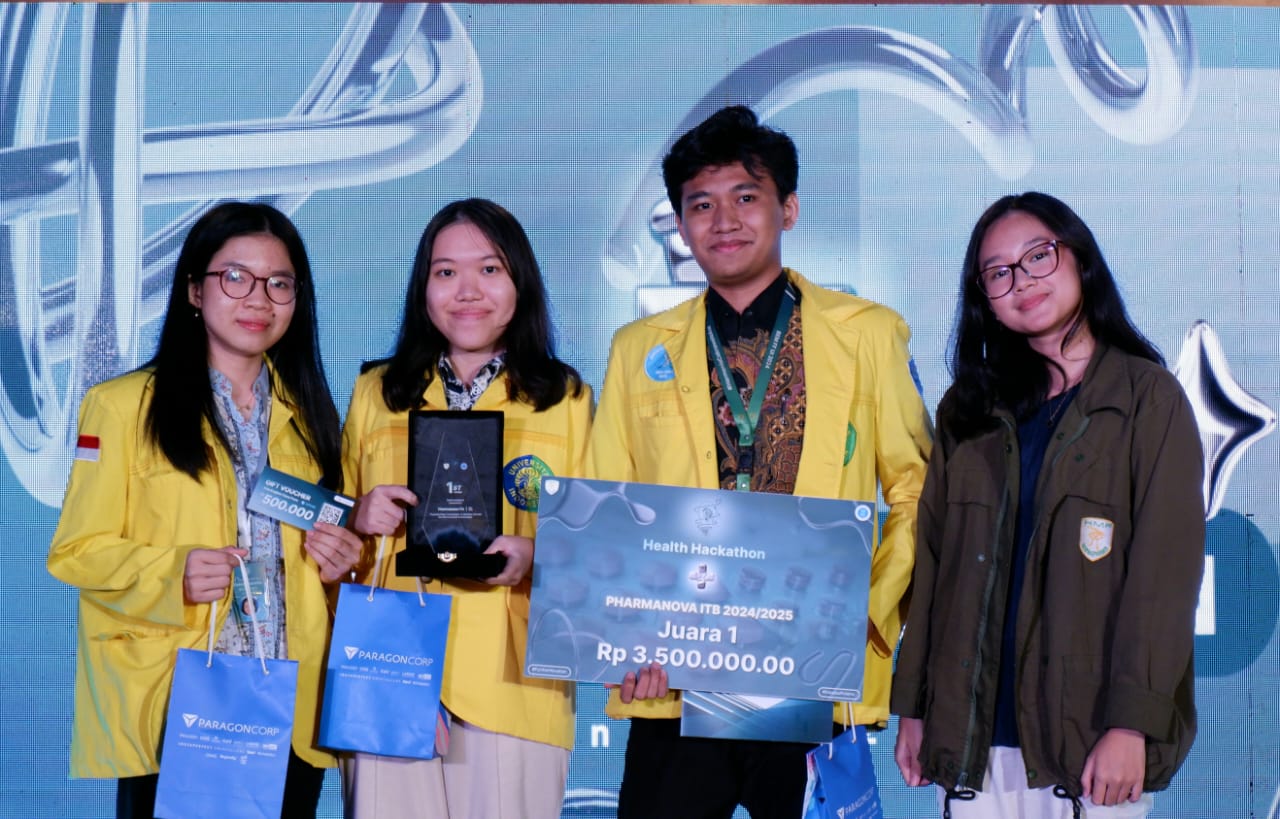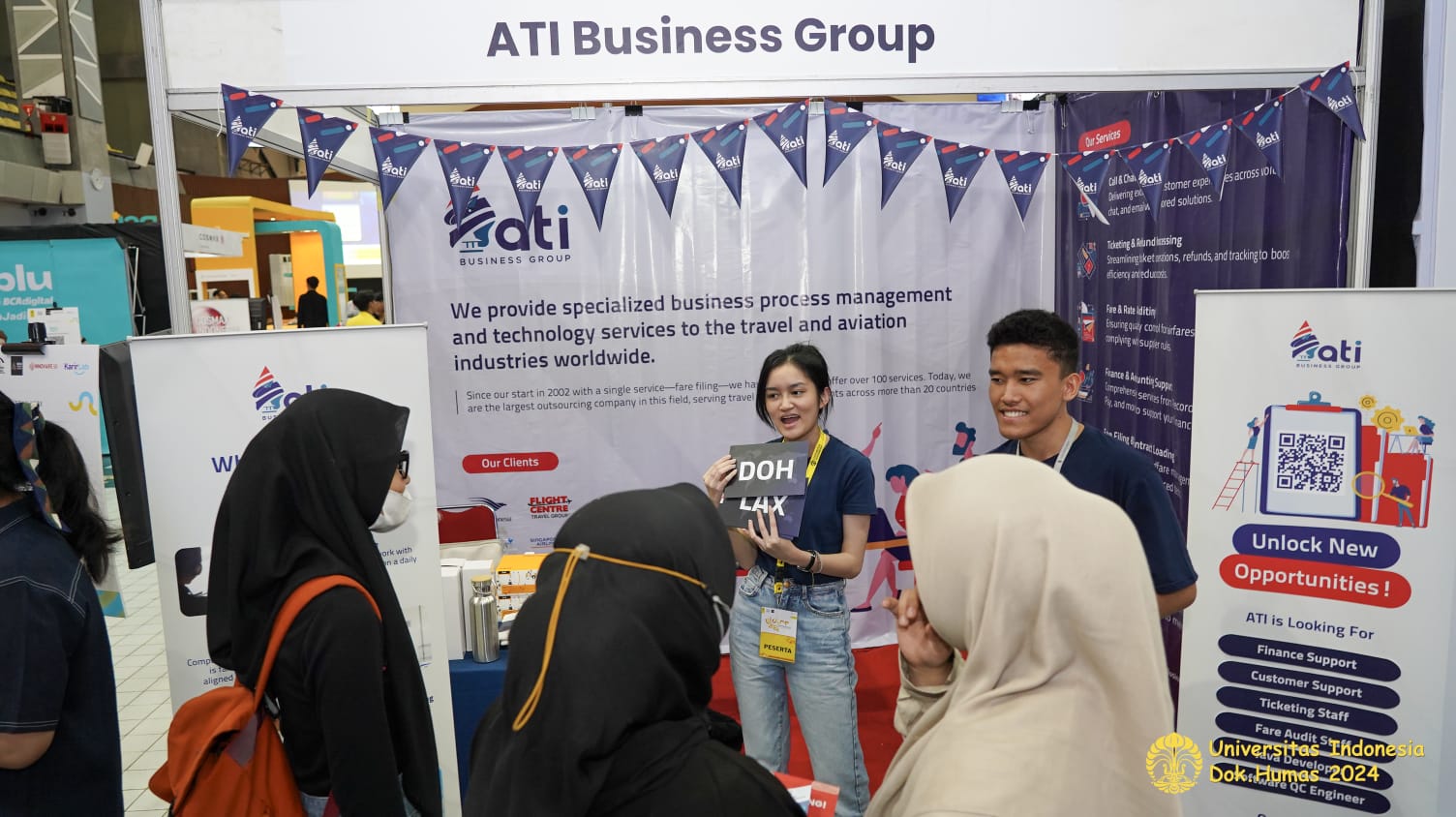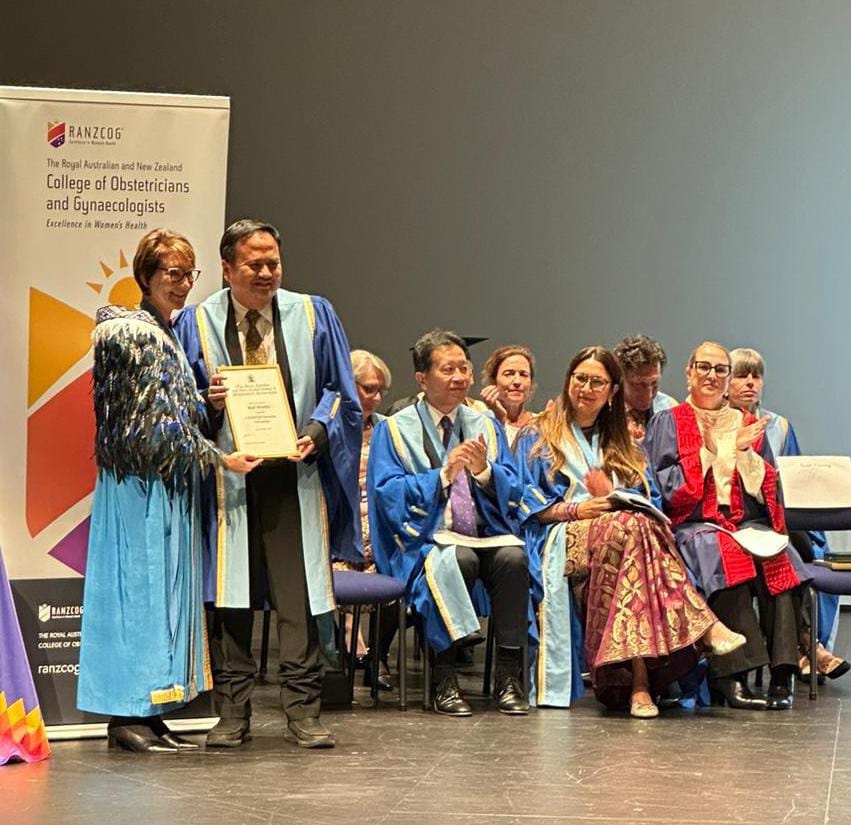
In the context of implementing the continuous quality improvement and the role of the Internal Quality Assurance System (SPMI) of Higher Education (Internal Quality Assurance) which has a major impact on the success of graduates to be accepted in the working field, Universitas Indonesia (UI) tries to examine more deeply, broadly, and currently the implementation of SPMI implementation in relation to employment.
The Academic Quality Assurance Agency (BPMA), as one of the units responsible for the implementation of quality assurance at UI, held a webinar entitled “Building a State-of-Art Internal Quality Assurance to Foster and Integrate Graduate Employability” which was held online on Thursday (18/08) with a keynote speaker. Plt. Director of Learning and Student Affairs of the Ministry of Education and Culture, Dr. Ir. Sri Gunani Partiwi, M.T.; and four qualified speakers who work as policy makers, academics, and quality assurance units from Indonesia, including Head of the Institute of Advanced Studies in Economics and Business / IASEB Faculty of Economics and Business UI, Turro Selrits Wongkaren, S.E., M.A., Ph.D.; Vice President of The International Network for Quality Assurance Agencies in Higher Education (INQAAHE) and Member of the Accreditation Council of the National Accreditation Board for Higher Education, Prof. Drs. T. Basaruddin, M.Sc., Ph.D; Head of the Quality Assurance Unit of the Bandung Institute of Technology Dr.rer.nat. Poerbandono, S.T, M.M; and Director of Secretariat and Strategic Planning Telkom University, Dr. Anisah Firli, S.MB. MM.
In his opening speech, Rector of Universitas Indonesia Prof. Ari Kuncoro, SE, MA, Ph.D., said that Universitas Indonesia (UI) continues to be committed in improving quality with the standard of international accreditation. “Currently, higher education institutions are required to improve their quality continuously where the Internal Quality Assurance System carried out at the university level will have an impact on the success of graduates to be accepted in the working field after graduate. Related to this, Universitas Indonesia (UI) sees the need to discuss the relationship between quality assurance of higher education institutions and employment,” he said. The Rector of Universitas Indonesia (UI) hopes that this webinar can raise awareness of trends in higher education quality assurance in the regional and global scope that connect quality assurance with the success of graduates in the real working field.
Plt. The Director of Learning and Student Affairs of the Ministry of Education and Culture said that SPMI has the role of connecting the quality of higher education to fulfill the needs of industry so that the employability rate can be raised. To fulfill this, a good quality internal network and the external quality assurance, including international accreditation agencies that are instrumental in assessing the quality of the learning process in Higher Education, are needed.
In her presentation titled “How to Strengthen Higher Education and Employment Linkage”, Sri gave a brief overview of university statistics in Indonesia and how the education system can strengthen the absorption of graduates in the workforce. “A total of 4,593 universities in Indonesia are expected to have quality that can be closer to Universitas Indonesia’s. For that, there needs to be a role for all of us and I thank BPMA UI for also inviting several other universities so that there can be collaboration between universities after this seminar,” he said.
According to Sri, the impact of the 4.0 industrial revolution and digitalization, by 2030 in Indonesia is there will be 23 million jobs replaced by automation, this creates an opportunity for 27-46 million new jobs to emerge. “The challenge is how to prepare our graduates to be able to capture new job opportunities that exist by preparing the quality of these graduates in accordance with what industry needs in the future. Students need to equip themselves with new skills, adapitve, agile learners, self directed, entrepreneur, human resources that have critical thinking skills, system thinking skills so that they can solve complex problems, digital literacy, multi-diciplinary, and global citizenship,” said Sri.
Currently, the government has transformed higher education policy by providing multiple pathways to develop competencies in graduates. The learning system offered by the Merdeka Belajar Kampus Merdeka (Independeny Learning) program is a form of higher education policy transformation efforts to provide space for students to hone their talents, passion and their in flexible learning. “In the Independent Learning program, students can take up to 20 credits in one semester. Lecturers are no longer the only source of learning, not only as learning partners, but as co-pilots who can follow how students choose to learn in the last three semesters. In this case, the challenge of quality assurance is to maintain accountability for the quality of learning in each university. Independent Learning program prepares graduates to be ready to compete and collaborate in the global era, by requiring strengthening of various skills needed in the 21st century through multidisciplinary experience and exposure,” Sri said again.
At the end of her presentation, Sri Gunani conveyed three strategies for higher education to improve competence and absorption of graduates in the real working field. First, the independent campus; second, the link & match and partnership with industry that continues to be carried out through student internships, industrial training, industrial sabbatical leave, adjunct professorship, and industrial research. The third strategy is partnership with world-class universities and diaspora, which are UK-Indonesia Consortium for Interdisciplinary Sciences (UKICIS), AI Institute-consortium of universities, joint research & projects, student/staff exchange, and world-class professors.
Furthermore, the first speaker in this webinar was Turro Wongkaren, a lecturer and researcher at the Department of Economics Universitas Indonesia Faculty of Economics and Business, who gave a presentation related to changes in the labor market and graduate employability. He cited data from the February 2022 National Labor Force Survey (Sakernas) published by the Central Bureau of Statistics, stating that as many as 33% of workers are underqualified, 16% are overqualified, and 51% are well matched. “Half of the workers in Indonesia are mismatched, one-third are unqualified, and the rest are overqualified. This is a sign that universities in Indonesia are not able to answer the challenges in the job market,” he said.
Turro revealed five changes in the job market. “First, structural transformation (change of agricultural sector to industrial/service sector); second, technological innovation (changing what previously existed and was in-modified, and also creates new jobs such as motorcycle taxis. online and youtubers); third, population age structure (the demographic bonus occurs unevenly, resulting in some people moving/migrating to places/regions that provide many resources and need workers); fourth, green economy (the movement towards sustainable development and a return to nature); and Fifth, uncertainty (pandemics and wars that make working life change such as work from home and work with zoom). But the five changes, the intensity does not occur in all sectors, and all people,” said the innovation and entrepreneurship expert, from FEB UI.
Agreeing with Turro, Prof. Chan Basaruddin as the second speaker, conveyed the overall perspective of higher education that the current global competition where online learning in higher education can be accessed openly with ease. “The challenge is that all universities in the world can compete. Non-traditional providers of credentials such as Google and Tokopedia provide learning resources that can be used as job-seeking capital. This makes it clear that you don’t have to go to university to learn,” said Prof. Chan.
The challenge for academic quality assurance is that universities are a global issue, so the quality must also be global standard. Furthermore, Prof. Chan explained the quality assurance of Higher Education from an eagle-eye perspective. “Universities are not managed by professionals because there is no professional training for/to be rectors, deans, and lecturers. Rooted in long academic traditions such as universal values, academic achievement, and integrity,” said the Dean of the UI Faculty of Computer Science from 2004-2013.
Prof. Chan defines relevance generally as the degree of sensitivity to stakeholder needs. Relevance includes three aspects, namely ensuring sustainability of employment, personal development, and all graduates will be active in the community. The competency areas required are knowledge, skills and dispositions. According to him, IQA & EQA are two sides of the same coin, with the ultimate goal of a functioning IQA effectively generating a culture of quality.
Also attending the seminar were Secretary of the Directorate General of Higher Education of the Ministry of Education and Culture of the Republic of Indonesia Prof. Tjitjik Srie Tjahtjandarie, Ph.D., UI Rector for the 2002-2007 period Prof. dr. Usman Chatib Warsa, SpMK, Ph.D., and Vice Rector for Finance and Logistics, Vita Silvira, S.E., Ak, MBA, CA. From the exposure of resource persons who are experienced in the field of higher education quality assurance, this webinar is expected to provide an understanding of the concepts, practices, and quality assurance models in higher education institutions. Not only that, this webinar is also expected to be a forum for higher education quality assurance actors such as lecturers, quality assurance units / personnel from state / private universities in Indonesia, and auditors / supervisors.reviewers to exchange ideas and discuss problems and experiences in the field.









